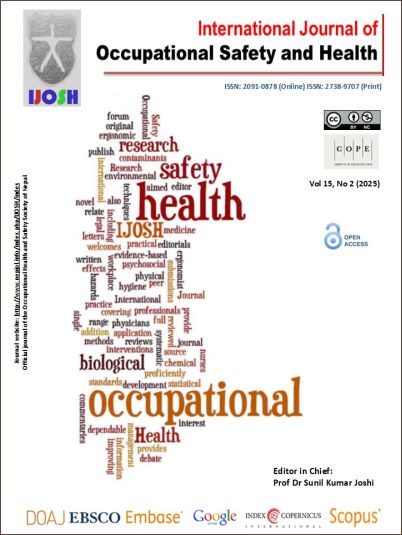Unveiling mental health memes: impact on employees’ well-being amid workload and occupational stress
DOI:
https://doi.org/10.3126/ijosh.v15i2.63493Keywords:
Anxiety, depression, mental health memes, occupational health, social media, stress.Abstract
Introduction: Occupational health concerns employees’ physical and mental well-being in the workplace. Common mental illnesses such as stress, anxiety, and depressive disorders constitute a growing threat to workplace well-being and the ability to meet demanding performance standards. In recent years, social media has played an important role in increasing the prominence of mental health memes, which serve as vehicles for the dissemination of mental health information with comedy and sarcasm. Despite the prevalence of mental health memes, we have a limited understanding of how these internet memes are interpreted in working contexts, particularly among employees with mental health difficulties. The objective was to explore whether employees in the workplace setting experiencing symptoms of stress, anxiety, and depression interpret mental health memes differently from control memes.
Methods: As the first study to examine how symptoms of stress, anxiety, and depression may influence the interpretation of mental health memes at the workplace, we consider this to be an exploratory investigation with no a-priori hypotheses. This study investigated the symptoms of stress, anxiety, and depression among forty-six employees (mean age 33, range 24-49, and 63.04% male) from administrative and the academic block of a private University, Dehradun in a workplace setting, along with their perceptions of mental health memes (related to stress, anxiety, and depression) compared to non-mental health memes (i.e., control memes depicting general social commentary). Twenty employees with clinically significant mental health symptoms (indicating ≥6 for depression, ≥5 for anxiety, ≥9 for stress on the DASS scale) and twenty controls (≤4 for depression, ≤3 for anxiety, ≤7 for stress) rated twelve mental health and control memes for relatability, humor, shareability, and feel-good potential.
Results: The findings indicate that in a workplace setting, employees with symptoms of stress, anxiety, and depression rated mental health memes as more relatable than the control group. However, there were no significant differences in terms of humor, shareability, or their potential to improve mood. In addition, no significant difference was observed in these factors for control memes.
Conclusion: Despite their predominantly negative connotation, online memes about mental health may have the potential to offer benefits to employees who are employed and consistently exhibit indicators of mental health issues within the workplace.
Downloads
Downloads
Published
How to Cite
Issue
Section
License
Copyright (c) 2025 The Author(s)

This work is licensed under a Creative Commons Attribution-NonCommercial 4.0 International License.
This license enables reusers to distribute, remix, adapt, and build upon the material in any medium or format for noncommercial purposes only, and only so long as attribution is given to the creator.





